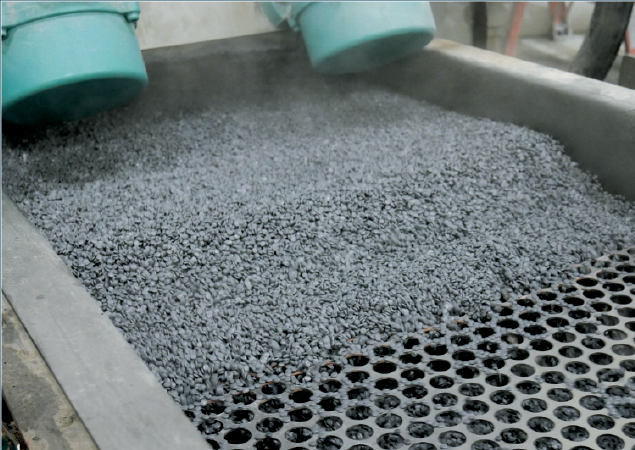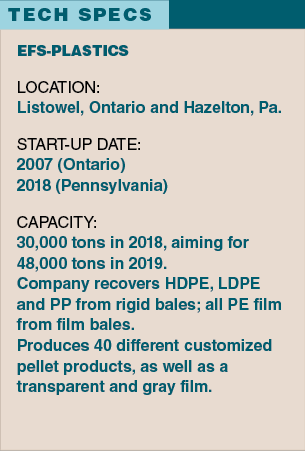
EFS is focused on materials that have traditionally been exported to overseas markets.
Mixed plastic bales have become increasingly difficult to move through the recycling system as overseas markets have diminished, leading some local programs to stop collecting plastics Nos. 3-7 altogether.
But North American processor EFS-Plastics extracts value from mixed bales, and the company is on the hunt for more supply.
Canada-headquartered EFS, which launched in 2007, processes material at two sites: a 75,000-square-foot mixed rigids and film processing plant in Listowel, Ontario and a 90,000-square-foot film processing plant in Hazelton, Pa.
EFS is focused on materials that have traditionally been exported to overseas markets. Since China banned imports of post-consumer plastic at the beginning of 2018 – and alternate markets in Southeast Asia similarly clamped down on plastic imports in the months that followed – exporting has become a far less viable option for moving recovered resins.
“There is a lot of material looking for homes in that sector,” said Eadaoin Quinn, director of business development and procurement for EFS. “The lower-value plastics, we see a lot of opportunity to expand in that space.”
Combined, the Ontario and Pennsylvania facilities took in about 30,000 tons of material last year, and by the end of 2019, EFS hopes to hit 48,000 tons. In 2020, “we will plan to far surpass that,” Quinn said.
 That’s because EFS is pushing forward on plans to open a third plant by early next year. The exact location of the operation has not been announced, but Quinn offered a regional hint.
That’s because EFS is pushing forward on plans to open a third plant by early next year. The exact location of the operation has not been announced, but Quinn offered a regional hint.
“We’re looking at closer to the West Coast,” Quinn said. “There’s a lot of material out there, and we don’t want to see it go over to China again.”
Today, at its Ontario facility, EFS brings in mixed bales from materials recovery facilities (MRFs) across Canada and the U.S, and the company focuses on extracting PE and PP. The facility uses a fully automated wet wash system, which was mostly designed in-house by staff engineers.
The company processes the post-consumer plastics all the way to the pellet stage. EFS customizes its products, currently offering roughly 40 pellet grades. Each has its own melt and strength properties, color and other attributes.
Pellets are sold into a wide range of applications, Quinn said, including consumer products, automotive, agricultural, construction and other markets.
Meanwhile, at the film facility in Pennsylvania, EFS brings in post-consumer film from MRFs and retail take-back programs across North America. The company produces both a transparent and a gray film.
“All the film we’re receiving, we’re putting back into film applications,” Quinn said. “Plastic bags back into plastic bags, which is unique for handling MRF-grade film.”
The third plant will operate similar to the Ontario facility, processing both mixed rigids as well as some film. The mixed plastics stream is slightly different on the West Coast, Quinn noted, generally including more plastics Nos. 1 and 2. So that facility will extract PET as well as the other PE and PP resins.
The third EFS site will be “our biggest facility to date,” Quinn said. “Pretty soon we’ll be starting to stockpile material for that facility – so we have a large capacity to handle mixed plastics right now.”
Although large volumes of mixed plastics are no longer moving to market, EFS is nonetheless having to search to meet its demand for mixed plastic feedstock.
The company recently put out a call for the material and Quinn said she is calling MRFs to source more bales. She noted that exporting mixed plastics was the industry norm before China’s restrictions, and some suppliers simply haven’t been aware of domestic options.
This story originally appeared in the Spring 2019 issue of Plastics Recycling Update. Subscribe today for access to all print content.
Know of a plastics processor that should be featured in this space? Email [email protected].

